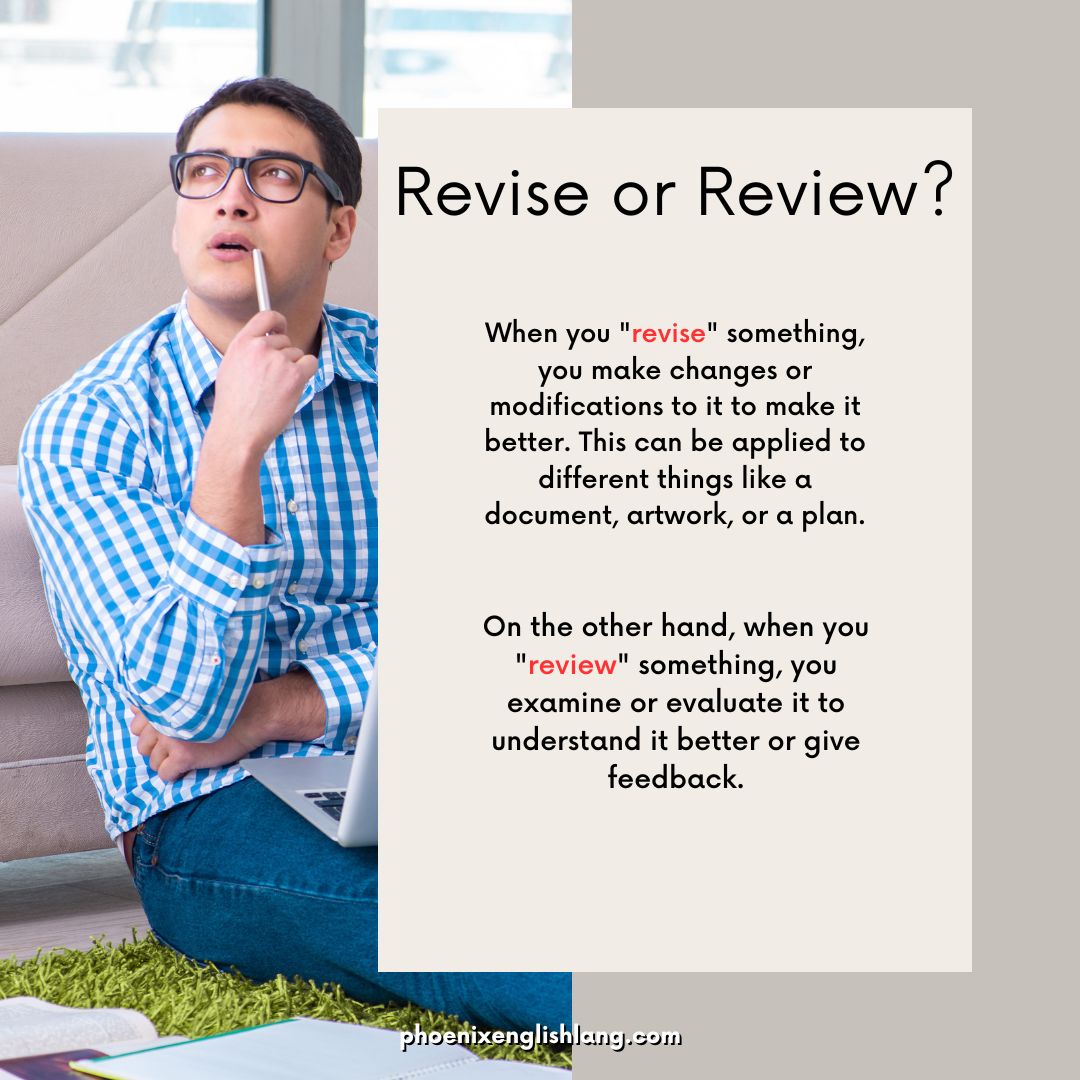In this article, we’re going to explore the main differences between “revise” and “review,” providing examples to illustrate each distinction. Understanding these differences can significantly enhance your studying or working experience, making your learning journey more effective and enjoyable.
The English language is rich with words that seem similar but have distinct meanings and uses. “Revise” and “review” are two such words that often cause confusion.
While they are sometimes used interchangeably in casual conversation, they have specific meanings that are important to grasp, especially in academic and professional contexts.
To start with, let’s define each term. “Revise” generally means to make changes to something with the aim of improving it. This could involve altering the content, structure, or style of a piece of writing, for example.
When you revise an essay, you might add new information, reorganize paragraphs, or refine your arguments to make them clearer and more compelling. The goal of revision is to enhance the overall quality of the work.
On the other hand, “review” typically means to examine or assess something. This could involve looking over a document to check for errors, evaluating the effectiveness of a project, or reflecting on your own performance.
When you review a book, for instance, you read it carefully and then provide an assessment of its strengths and weaknesses. The purpose of a review is to provide feedback or a critical evaluation.
Understanding these definitions is the first step in distinguishing between the two terms. However, the differences become even clearer when we look at specific examples of how “revise” and “review” are used in various contexts.
In an academic setting, students are often asked to revise their essays before submitting the final version. This process might involve incorporating feedback from a teacher or peer, reworking the thesis statement, or adding more evidence to support an argument.
Revising is an iterative process that can take multiple rounds of changes to get right. It requires a critical eye and a willingness to make substantial alterations to improve the work.
In contrast, students might review their notes before an exam to refresh their memory on the material covered. This involves going over the content to ensure they understand the key concepts and can recall important details. Reviewing is more about reinforcing existing knowledge rather than making changes to the material itself.
In a professional context, an editor might revise a manuscript by suggesting changes to the plot, character development, or dialogue to make the story more engaging. This could involve cutting out unnecessary scenes, adding new chapters, or refining the language to better capture the author’s voice.
The editor’s goal is to help the author produce the best possible version of their work.
Meanwhile, a manager might review an employee’s performance by assessing their achievements, identifying areas for improvement, and providing feedback. This review process helps the employee understand how they are doing and what they can do to improve.
It is a critical part of professional development and helps ensure that both the employee and the organization are on the right track.
By understanding the distinct meanings and uses of “revise” and “review,” you can apply these concepts more effectively in your own work and studies.
Whether you are revising a piece of writing to make it stronger or reviewing material to prepare for an exam, knowing the difference between these two processes can help you achieve your goals more efficiently.
Which one is right – Revise or Review? What’s the main answer?

The words “revise” and “review” are often used interchangeably, but they mean different things and have different purposes.
When you “revise” something, you make changes or modifications to it to make it better. This can be applied to different things like a document, artwork, or a plan.
On the other hand, when you “review” something, you examine or evaluate it to understand it better or give feedback.
You can review books, movies, products, or even performance evaluations. The choice between revise and review depends on the context and objective.
If you want to make improvements or modifications, then you should revise. But if you want to evaluate or analyze something, then you should review.
You need to consider the purpose and what you want to achieve when deciding between these two terms.
You might also enjoy: Sweeped Vs Swept: 7 Differences + Examples [2023]
1. Definition and Purpose of Revise or Review :

The words “revise” and “review” are used a lot in different situations, and it’s important to understand what they mean and why they matter.
So let’s dive into the definitions and purposes of these words in more detail. First off, “revise” means making changes or fixing something to make it better.
This can apply to lots of things, like papers, art, plans, or even strategies. When you revise something, you take a close look at what’s already there and make adjustments to make it clearer or more effective.
The goal of revision is to make the thing you’re working on the best it can be and meet the standards you want. On the other hand, “review” is all about looking at something and understanding it better or giving feedback.
You can review all sorts of things, like books, movies, products, or even how well someone did at their job.
The purpose of a review is to really think about and judge the thing you’re reviewing, pointing out what’s good and what could be better.
Reviews are meant to help others make choices or improve what’s being reviewed.
Even though both revision and review involve looking at something closely, they have different main goals.
Revision is about making things better or changing them to work well. It’s about taking a proactive approach to make something the best it can be.
On the other hand, review is more about understanding and giving feedback. It’s about figuring out what’s good and what’s not, and giving recommendations or judgments.
Which one you choose, revision or review, depends on what you’re trying to do. If you want to make something better or change it, then go with revision.
You’ll carefully look at what’s there and make the changes needed to make it better. But if you want to understand or judge something, then review is the way to go.
You’ll really think about the thing and point out what’s good and what could be better. In the end, revision and review are different processes with different goals.
Revision is about making changes to improve something, while review is about understanding and giving feedback.
It’s important to know what these words mean and why they’re important so you can use them right and get the results you want.
2. Time Frame of Revise or Review :

The time frame for revising and reviewing stuff can change depending on the situation and the task at hand.
When it comes to revising, you can be pretty flexible with the timing. How long it takes to revise something depends on how complicated and long the stuff is, and also how good you are at it.
For example, revising a short document might only take a few minutes or hours, but revising a long manuscript or a complicated project could take days, weeks, or even months.
How long it takes to revise also depends on how much detail and thoroughness you want. Sometimes you might just need to make a few small changes, but other times you might need to completely redo everything.
On the other hand, reviewing usually has a more set schedule. Reviews usually happen within a certain time period, like when you’re evaluating a product, giving feedback on a document, or having a performance review.
How long the review process takes can change depending on what you’re doing and how much stuff there is to review.
It could be as short as a few minutes for a quick review, or it could take several hours or even days for a detailed evaluation.
So basically, revising can vary a lot and be pretty flexible, while reviewing usually has a more structured schedule with set deadlines or times for evaluation.
You might also enjoy: In Vs Within in English Grammar: 10 Main Differences
3. Focus:

When it comes to revising, the main focus is on making things better and changing stuff in the content or material.
The goal of revising is to make the work better in terms of quality, clarity, coherence, and overall effectiveness.
This means looking at how the content is structured, organized, and flows, as well as fixing the language, grammar, and style.
Revising also involves checking that the information is accurate, relevant, and consistent. The main focus is finding areas that need to be improved or corrected and making changes so that the final product meets the desired standards.
On the other hand, when it comes to reviewing, the focus is on evaluating and judging.
The main objective of a review is to critically analyze and give feedback on the subject being reviewed.
This could involve looking at the strengths and weaknesses, finding areas that could be improved, and giving constructive criticism or recommendations.
Reviews often focus on evaluating the overall quality, performance, or effectiveness of a product, service, document, or performance.
The attention is on understanding the subject really well, assessing its merits, and giving an informed judgment or evaluation.
In summary, revising is about making improvements and changes to enhance the quality and effectiveness of the content, while reviewing is about evaluating and judging the subject to give feedback, criticism, or recommendations.
4. Depth of Analysis:

The depth of analysis in revising and reviewing can vary depending on the purpose and scope of the task.
When it comes to revising, the depth of analysis usually involves a really good look at the content or material being revised.
This might include checking out the structure, organization, clarity, coherence, and overall effectiveness of the work.
When it comes to written stuff, revising often means looking for grammar mistakes, improving sentences, finding better words, and making sure everything makes sense.
In other cases, like revising a project or a plan, the analysis might involve figuring out if it’s doable, finding ways to make it better, and making changes to get the result we want.
The point of analyzing when revising is to make the work better. On the other hand, when reviewing something, the analysis is all about looking at and judging what we’re reviewing.
This analysis can include different things depending on what we’re reviewing. For example, in a book review, we might look at the story, characters, writing style, themes, and how the book affected us.
In a product review, we might look at how well it works, what features it has, how easy it is to use, how long it lasts, and if customers like it.
The point of analyzing when reviewing is to give a complete and well-informed evaluation of what we’re reviewing, usually with feedback, suggestions, or judgments.
To sum it up, analyzing when we revise means really looking at and improving the content or material being revised, while analyzing when we review means judging and evaluating what we’re reviewing.
Both things need careful analysis, but what we focus on and what we want to achieve might be different depending on what we’re doing.
5. Goal (Revise Vs Review):

The main idea behind revising and reviewing is to make something better, but they have different goals and approaches.
When you revise something, your main goal is to make changes and improvements. It doesn’t matter if it’s a piece of writing, artwork, or a plan – the point is to make it better.
You go back and work on it to make sure it meets the standards, fixes any problems, and fits with the original purpose.
You take a hard look at it, figure out what needs to be improved, and make those changes.
This might mean reorganizing, clarifying, strengthening arguments, making the flow better, or improving the language.
The goal is to make it more polished and effective so that it gets the message across or achieves what it’s supposed to.
On the other hand, when you review something, your goal is to evaluate and give feedback. You can review books, movies, products, or even how someone is doing at their job.
The point is to look at the good and bad parts, and then give your opinion or assessment. This helps with making decisions, improving things, or comparing different options.
During a review, you want to get all the information you need, analyze it carefully, and then give an objective and helpful evaluation.
This might involve looking at the quality, accuracy, relevance, and impact of the thing you’re reviewing.
You also want to find areas that can be improved or potential problems. The goal of a review is to give good insights, suggestions, or judgments that can help in the future, inform others, or make things better.
So, revising is about making things better and reviewing is about evaluating and giving feedback.
Both are important for getting things to a higher standard, making sure they’re good, and keeping on improving.
You might also enjoy: Totalled Vs Totaled: 10 Main Differences + Examples [2023]
6. Process (Revise Vs Review):

The process of revising or reviewing has a bunch of steps to make sure we evaluate or improve the subject really well.
When it comes to revising, we start by looking at the existing material really carefully.
We read or analyze the content to find areas that need changing or making better. We gotta think about how the material is structured, if it’s clear, if it makes sense, and if it’s effective during this stage.
Once we figure out what needs improving, the next step is to make the changes. That can mean rewriting parts, organizing things better, making the language clearer, or adding new stuff.
It’s super important to stay focused on what the material is supposed to do while we’re making changes. After we make the changes, we gotta review and proofread everything to make sure it’s accurate, consistent, and looks right.
On the other hand, reviewing is all about evaluating the subject in a systematic way. It starts by setting clear criteria or goals for the review.
The criteria can be different depending on what we’re trying to do, like checking how good a product is, seeing how well someone is doing, or analyzing a document.
Then we gotta get the right info or data to support the review. That can mean doing research, getting feedback from users or people involved, or looking at performance numbers.
Once we have the info we need, we gotta analyze and understand what we found. That can mean comparing the subject to the criteria we set, figuring out the good and bad parts, and giving helpful feedback or ideas.
The last step in the review process is to make sure we communicate the results well. That could mean writing reports, giving presentations, or having discussions with the right people.
So basically, revising means looking at the material carefully, making changes, and checking that everything looks good.
Reviewing means setting goals, getting the right info, understanding what we found, and telling people about it.
Both processes need us to pay attention to details, think critically, and focus on improving or evaluating the subject in a good way.
7. Examples of Revising:

– Fixing up sentences or paragraphs to make them easier to understand.
– Putting in examples or proof to back up what you’re saying.
– Changing around how the document is set up to make it flow better.
8. Examples of Reviewing:

– Checking a document for grammar mistakes, spelling errors, or typos.
– Making sure the data or information in a report is correct.
– Checking if a presentation or project is good overall.
You might also enjoy: Affirm Vs Confirm In English: 10 Differences You Need To Know
9. Iterative Process of Revise or Review:

The processes of revising and reviewing are like a never-ending cycle where you keep looking at things again and again to make them better.
It’s all about making continuous improvements and making sure that the final result is what you wanted.
So, when you’re revising something, you’re basically going through it step by step and making changes to the content or structure. You start by giving it a once-over and figuring out what needs fixing.
It could be things like grammar mistakes, things that don’t make sense, or stuff that needs more info.
Once you’ve identified the problem areas, you make the necessary changes. Then you go back and review it again to see if those changes worked.
This second review might show you other things that need fixing or things that went wrong with the first changes you made.
And you just keep doing this over and over until you’re happy with how it looks and sounds. The same kind of thing happens when you’re reviewing something.
You go through it with a fine-tooth comb and give feedback based on what you were looking for.
That feedback is then used to make more changes and improvements. You review it again to make sure you got it right and to see if there are any new problems.
And you just keep doing this until you’ve got something that’s really good. Each time you do this, you get a better understanding of what you’re working with and you make it even better.
So, in a nutshell, revising and reviewing is all about going through things again and again, making changes, and checking if they worked. It’s a way to keep getting better and make sure you’ve done what you set out to do.
What does it mean to revise something?
To revise something means to review, amend, or make changes to improve its quality, accuracy, or overall content. It involves a careful examination and modification of written or spoken material to enhance clarity, coherence, or effectiveness.
What does revised mean in English?
“Revised” is the past participle form of the verb “revise.” In English, it indicates that changes, amendments, or improvements have been made to something, often a document, text, or work, through careful review and modification.
What is a better word for revise?
An alternative word for “revise” could be “edit” or “modify,” depending on the specific context.
What does revise mean in English Oxford?

In English Oxford, the term “revise” retains its general meaning as mentioned earlier, which is to review, amend, or make changes to improve the quality, accuracy, or overall content of something, often a written document or work. Oxford English may provide nuanced definitions or examples, but the core meaning remains the same.
Does revise mean change?
Yes, “revise” does involve making changes. When you revise something, you review and modify it with the intention of improving or updating its content, structure, or overall quality. So, in essence, revising does entail making changes to the original material.
Should I revise and resubmit?
If you have received feedback or suggestions to revise and resubmit your work, it’s generally advisable to do so. Revising allows you to improve your content based on feedback or address any issues that may have been identified. It demonstrates a commitment to enhancing the quality of your work before resubmitting it. Always consider the specific feedback and guidelines provided to make informed revisions.
Is revise and resubmit a rejection?
No, a “revise and resubmit” request is not a rejection. It indicates that there are specific areas in your work that need improvement or adjustment according to the feedback received.
It’s an opportunity for you to address those issues and enhance the quality of your submission. Once you’ve made the revisions, you can then resubmit your work for further consideration. It’s a positive step toward improving your chances of acceptance.
How many times should you revise?
The number of times you should revise depends on various factors, including the complexity of your work, the quality of feedback received, and your own standards for improvement.
It’s common for revisions to go through multiple iterations to refine and enhance the content. Strive for clarity, coherence, and effectiveness in your work, and revise as needed until you are satisfied with the final result or until you meet the requirements set by your audience or evaluators.
What time is best to revise?
The best time to revise can vary based on individual preferences and energy levels. Some people find they are more focused in the morning, while others might be more productive in the afternoon or evening.
Experiment with different times of the day to identify when you are most alert and can concentrate effectively. Ultimately, choose a time that suits your personal rhythm and allows you to revise with focus and attention to detail.
What is the full meaning of review?
The term “review” has several meanings depending on the context, but in the general sense, it can mean to examine or assess something critically.
As a noun, it can refer to a formal assessment or critique of something, such as a review of a book, movie, or performance. In a business context, it might also refer to a thorough examination or assessment of a situation or process. The full meaning can vary based on the specific use and context of the word “review.”
What is the same meaning of review?
Synonyms for “review” include terms like:
- **Examine**
- **Assess**
- **Evaluate**
- **Appraise**
- **Inspect**
- **Critique**
These words can be used interchangeably in certain contexts where the idea is to carefully consider, analyze, or assess something.
What can I use instead of review?
Depending on the context, you might use alternatives like:
- **Examine**
- **Assess**
- **Evaluate**
- **Analyze**
- **Critique**
- **Inspect**
- **Appraise**
Choose the synonym that best fits the nuance and tone you intend to convey in your specific situation.
Conclusion:
Grasping the distinctions between revising and reviewing is essential for effective learning and growth. Although these terms are frequently used interchangeably, they fulfill different roles and can greatly influence the quality of your work and your overall educational journey.
Revising is about making enhancements to the content, organization, and clarity of your writing. It plays a vital role in the writing process, allowing you to refine your thoughts, strengthen your arguments, and ensure your message is communicated clearly.
During revision, you go beyond merely fixing mistakes; you also rethink and reshape your work to enhance its strength and coherence. This may include incorporating new information, rearranging sections, or rewording sentences for better readability.
The aim of revision is to create a polished and well-structured piece that aligns with your goals and connects with your audience.
On the other hand, reviewing is about examining and assessing your work to identify areas for improvement.
This process involves critically evaluating your work to ensure that it meets the required standards and fulfills its purpose. Reviewing can help you catch mistakes, assess the effectiveness of your arguments, and ensure that your work is accurate and complete.
It is an essential step in maintaining the quality and integrity of your work. By reviewing your work, you can ensure that it is free of errors, logically structured, and effectively communicates your ideas.
By recognizing when to revise and when to review, you can optimize your efforts and produce high-quality work that meets your goals and expectations. Knowing when to apply each process can save you time and effort, allowing you to focus on what matters most.
For instance, if you are working on a draft, you might start with a review to identify any major issues or gaps. Once you have a clear understanding of what needs to be improved, you can move on to revising, making the necessary changes to enhance your work.
In academic settings, the ability to effectively revise and review your work is essential for success. Whether you are writing an essay, preparing a presentation, or conducting research, these skills can help you produce high-quality work that meets academic standards.
By revising, you can ensure that your arguments are well-supported and your writing is clear and concise. By reviewing, you can catch any errors or inconsistencies and ensure that your work is accurate and complete.
In professional settings, the ability to revise and review your work is equally important. Whether you are writing a report, creating a proposal, or developing a project plan, these skills can help you produce work that is polished and professional.
By revising, you can ensure that your work is well-organized and effectively communicates your ideas. By reviewing, you can catch any mistakes and ensure that your work meets the required standards.
Moreover, understanding the differences between revising and reviewing can also enhance your personal development. These skills can help you become a more effective communicator, a better critical thinker, and a more efficient learner.
By applying these skills in your everyday life, you can improve your ability to analyze and evaluate information, make informed decisions, and achieve your goals.
In summary, mastering the art of revising and reviewing is essential for effective learning and improvement. By understanding the differences between these two processes and knowing when to apply each one, you can optimize your efforts and produce high-quality work that meets your goals and expectations.
Whether you are a student, a professional, or simply someone who wants to improve their skills, these processes can help you achieve success in your endeavors. So, take the time to revise and review your work, and you will see the benefits in the quality of your output and the effectiveness of your communication.

Hi, welcome to my blog! My name is Omid and I am thrilled to have you here! I am an English language teacher with 12 years of experience and hold multiple international certifications (TESOL, IELTS, TOEFL, PTE, CELTA). Additionally, I hold a PhD in Applied Linguistics with a specialization in Teaching English as a Second Language (TESL), which fuels my passion for teaching English and assisting others in mastering the language. To me, nothing is more rewarding than helping individuals enhance their English language abilities through various methods. So, let’s embark on this journey of learning English together.




